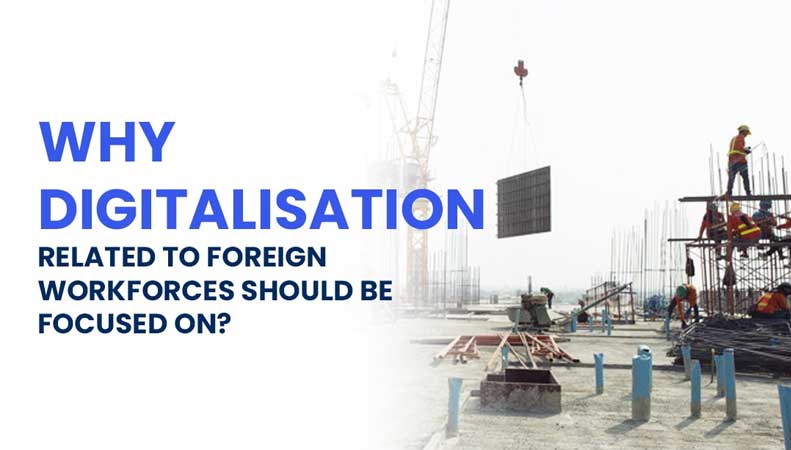
WHY DIGITALISATION RELATED TO FOREIGN WORKFORCES SHOULD BE FOCUSED ON
20th April 2021
Many in the travel and tour industry were prepared to close shop in 2020 due to the Covid-19 pandemic which caused borders to close and restricted movement within and across countries. It is important to maintain a steady supply of foreign workers to keep the country's economy afloat. It can assist the country in two ways: by leveraging its established network of business partners and industry expertise, and by offering digital solutions for the management of international workforces.
The rapid rise in computing resources available to both customers and businesses, as well as nearly ubiquitous Internet access and other digital advancements, are transforming the way workers and businesses operate today. Increased workplace digitization benefits businesses by increasing efficiency, cost savings, a more flexible and agile workforce, and overall increased versatility and adaptability in a highly complicated marketplace. Businesses are collaborating more internationally and with a more diverse and international workforce. Employees can now operate from anywhere in the world, from the tropics to the poles, as long as they have access to reliable Internet. Even critical avenues of business such as remittance have been simplified with the advent of e-wallet’s that can be used in Malaysia and globally.
Artificial intelligence, smart technology, automation, and robotics, among other emerging innovations, are expected to have a significant impact on all facets of our culture, lives, and economy. While some of the changes would certainly enhance our lives, the exact nature of the digital revolution's anticipated effect on labour and jobs is debatable. According to research, a decrease in labour demand and salaries, as well as major qualitative changes in the labour market, can be anticipated, resulting in a mismatch between available and needed skills for the potential workforce.
Benefits offered
The platform, which is expected to serve 360,000 Myanmar employees by 2021, will be able to facilitate safe online transactions such as banking, travel, insurance, and other commercial services for international migrant workers in a seamless manner. Future services that could be provided include integration with cell phones through optional embedded secure elements, as well as integration with mobile apps.
Enrolment and registration, encoding of personal and biometric data, and integration with mobile applications are the three key components of the digital identity to be installed in mobile devices.
Third-party logistics systems, such as logistics policy, inventory preparation and control, and inbound, outbound, and reverse logistics management, are all planned for smartphones. The aim is to use a cutting-edge technology-enabled system to digitally replace physical identity documents. Debit and credit cards, for example, can now be easily replaced with apps in smartphones powered by high-end stable hardware chips.
Traditional physical identification papers, such as national identity cards, driver's licenses, and worker identification cards, will inevitably be replaced by high-tech e-ID embedded in smartphones.
Fintech in the pipeline
Financial technology will play a role in the digitisation process, as will new-age travel management company ethos that emphasizes technology.
Other revenue-generating elements from the digital services to be offered to international migrant workers will be launched. E-wallet and cashless payments are in the works, as are e-services such as mobile reloads and bill payments in both source and destination countries, e-remittance, e-assistance for legal, medical, housing, and notification purposes, e-commerce, and job listings.
The US$100 million deal with Diamond Palace is an exclusive 30-year concession with the Myanmar government to import employees from Myanmar.
Flight, logistics, and dormitory arrangements, as well as medical exams, are all services offered by job agencies for employees moving from one country to another. For the time being, the agreement only applies to Myanmar employees applying for jobs or leaving Malaysia, Japan, or Thailand, but it will potentially extend to all Myanmar workers.
This shift to provide foreign workforce management services is a fantastic opportunity for us, as the need for foreign migrant workers will resurface as the economy improves and borders reopen. Remittances from Myanmar employees abroad are projected to be worth about US$900 million per month. One million Myanmar jobs are believed to be in Malaysia, with another four million in Thailand.
Reduce cost and time
The digital platform allows employers of foreign workers to communicate with workers on a never-before-seen scale, allowing them to carry out their core activities in radically different ways.
It aims to improve the quality of salary disbursement and workers' financial management by reducing the expense and time associated with structured recruitment processes.
Technology will contribute to wider systemic and policy change by widening the realm of potential action for migrant workers. International workers would be able to use digital tools to complete tasks that they are already performing – but in an easier, cheaper, and sometimes safer manner.
EVOLET is a digital wallet app for migrant workers.
Learn more at https://evolet.io/
